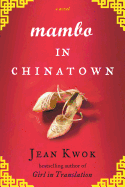A sold-out crowd of librarians gathered for the annual SLJ Day of Dialog, held on May 28 at McGraw-Hill's offices in midtown Manhattan. The day's themes revolved around the craft of storytelling and the importance of diverse stories.
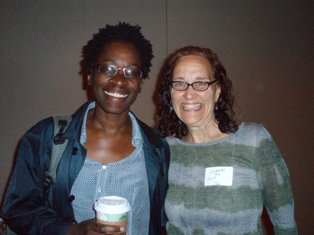 |
|
Keynote speaker Jacqueline Woodson with SLJ's Luann Toth.
|
Opening keynote speaker Jacqueline Woodson read from her forthcoming middle-grade memoir, Brown Girl Dreaming (Nancy Paulsen/Penguin). "Writing was the thing that, from a young age, I loved doing," Woodson said. "I wrote this book in verse because that's the way memory comes to me," she explained, "in moments, with lots of air around them." She thought of calling her book Black Girl Dreaming or American Girl Dreaming. "But 'brown' is so much of who I am," said Woodson, "and being African-American is so much of who I am. My grandmother was always saying, 'You're a pretty brown girl.' " Show Way was her first autobiographical story. Her grandmother, who helped raise her in South Carolina, would reel off the family's deep Southern names, and the author felt it was as if her grandmother had said, "Here's the license to tell these stories." Woodson said, "So much of our history was about not surviving, we were brought here in chains, to work until we died. We did not die. We became doctors and lawyers and writers and presidents."
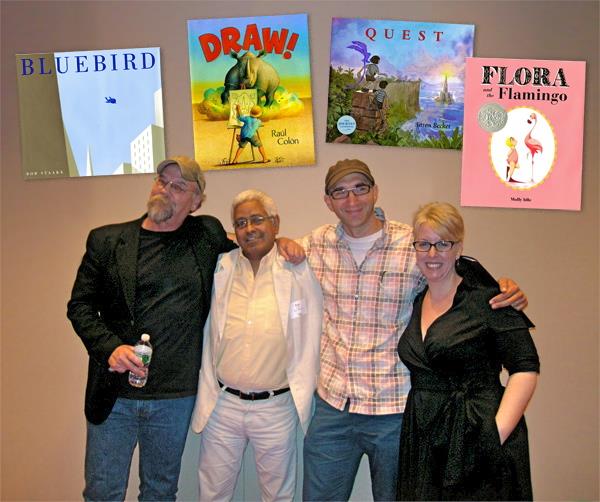 |
|
(l-r.) Bob Staake, Raúl Colón, Molly Idle and Aaron Becker.
|
In the "Wordless Picture Books" panel, moderated by Simmons College's Cathryn Mercier, Aaron Becker said that in Quest (Candlewick), the second in his wordless Journey trilogy, "My goal was to convey complex action, emotion and possible resolution all at once." He purposefully painted a neutral look on the characters' faces so children can decide for themselves what the characters are experiencing. Raúl Colón recalled that as an asthmatic child, he would watch his friends playing outside while he was inside drawing. In his book Draw (Paula Wiseman/S&S), the child hero ends up going to Africa, and instead of hunting animals, he draws them. "You provide the visuals in your head as you read a story," Colón said. "Wordless picture books do the opposite. The child writes the story." Molly Idle, author and artist of the forthcoming Flora and the Penguin (Chronicle), agreed, adding, "Wordless books leave room for children to inhabit the story." Bob Staake (Bluebird, Schwartz & Wade/Random House), upped the ante: "Wordless books elevate the importance of the child. If you weren't here, the book would not survive. They get to own the story."
Moderator Allie Bruce, Bank Street College's children's librarian, introduced the "Diversity in Middle Grade Fiction" panel by reading a quote from Maya Angelou (who had died earlier that morning): "It is time for parents to teach young people early on that in diversity there is beauty and there is strength." Bruce asked what she, as a white librarian, might be unwittingly doing to impede the discussion, and what she could do better. Kat Yeh (The Truth About Twinkie Pie, Little, Brown) suggested that librarians "not make assumptions about what kids want to read." She cited Grace Lin's proposal that instead of presenting Where the Mountain Meets the Moon as "a Chinese book by a Chinese author and artist," it could be called "a great adventure book." Coe Booth (Kinda Like Brothers, Scholastic) noted that bookstores only seem to display books by authors of color "when there's a reason." She said, "Why not on Valentine's Day? Black people fall in love." Kwame Alexander recalled one "awesome" letter he'd received in response to his book The Crossover (Houghton Mifflin Harcourt) that asked, "Were you intentionally ambiguous about the race of your characters?" Alexander added, "We all love, smile, cry. If we can get past these labels, we can become more diverse people, as opposed to trying to find diverse books."
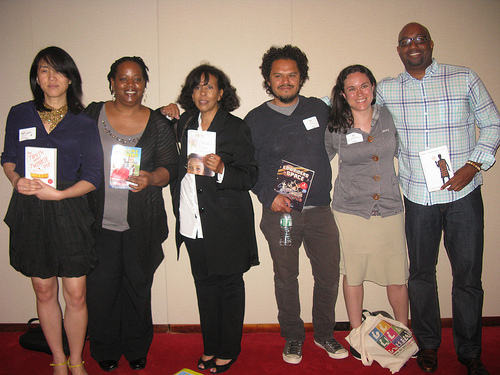 |
|
Kat Yeh; Coe Booth; Brenda Woods; moderator Raúl Gonzalez; Bank Street College children's librarian Allie Bruce; Kwame Alexander.
|
Raúl Gonzalez (illustrator of Lowriders in Space by Cathy Camper; Chronicle) said that as someone who grew up in the border town of El Paso, Tex., he was "not necessarily thinking about race," but rather the things and the people that surrounded him as a boy. "I was searching for things I could relate to," Gonzalez said. "The Mexicans [on television] were all gangsters or maids. Low Riders is about dreamers, it shows kids that dreams are possible." Brenda Woods (The Blossoming Universe of Violet Diamond, Penguin) noted that, as an author of historical fiction, "rather than being racially driven, my books are historically based." She added, "We have the opportunity to move this generation beyond tolerance to a place where they can celebrate the lives of all human beings." Alexander added that at some point, the responsibility is on the reader also. "Are you reading race?" he posed. "As Baldwin said, 'Our stories are universal.' "
"Dad, where do novels come from?" began Garth Nix (Clariel, HarperCollins) in his lunchtime keynote speech. "When an author and an idea love each other very much...." He discussed the importance of writers learning to write by reading, "how to work that transfer from mind to mind." Just some of the books he cited as influential for his Abhorsen Cycle: The Blue Sword by Robin McKinley, The Weather Monger by Peter Dickinson, Ursula Le Guin's A Wizard of Earthsea and Tolkein's The Lord of the Rings, which taught him about "the personal cost of doing what must be done. Also, the proper use of semicolons." Nix closed with a story about how, as a young man, he met the author Irskine Henry, who wrote his favorite book, Return of the Elephant. As attendees eagerly scribbled the name of the writer, Nix admitted the man was a fiction, providing the perfect segue to the next panel: "Unreliable YA Narrators."
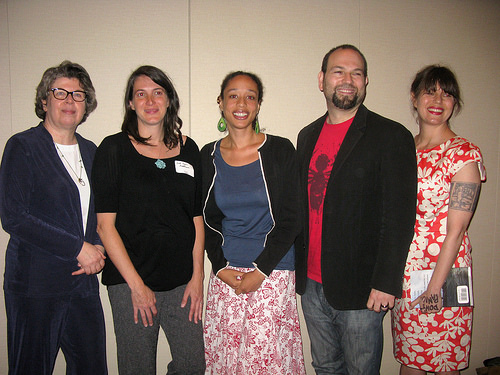 |
|
(l.-r.) Meg Wolitzer, Jody Lynn Anderson (The Vanishing Season, HarperCollins), Alaya Dawn Johnson, Barry Lyga, E. Lockhart
|
Brooklyn Public Library's Jennifer Thompson posed a two-part opening question: "How can you ever believe any narrator again? Do you concern yourself with the likability of the main character?" Barry Lyga (the I Hunt Killers series, Little, Brown) confessed, "I've never once worried about creating a likable character, as those of you who've read my books know. There's no such thing as a completely likable person." E. Lockhart (We Were Liars, Delacorte) asked, "Do they involve you?" She cited the money-hunting heroine of Gentlemen Prefer Blondes. "Everything she does is despicable, but she invites you in." Meg Wolitzer (Belzhar, Dutton) harked back to the question that influenced the Gore vs. Bush campaign, " 'Who would you rather have a beer with?' The thing you remember about a book is not plot but character. If you have to relate to a character, you can't read Lolita. There are a lot of experiences that are outside your wheelhouse." Alaya Dawn Johnson (Love Is the Drug, Scholastic) said that Chime by Frannie Billingley features one of her favorites: "I like unreliable narrators who are unaware of why they're not reliable." Lockhart added that in Chime, "the narrator is also lying to herself." She stressed that secret-keeping and lying are an integral part of adolescence. Wolitzer admitted she loves rereading the stories of unreliable narrators. "We're like Candide," she said. "We're led along and trust that it's true." Lyga added, "In the modern era, all narrators are unreliable, it's just a question of how unreliable."
For the "Storied Lives" panel, Baltimore County Public Library's Paula Willey began by asking Lois Ehlert about the seeds of her picture-book memoir The Scraps Book (Beach Lane/S&S). "I thought it was time to talk about my house and my life," Ehlert said, "and to share some ideas with young people. If you feel creative, don't worry! I grew up always knowing I wanted to be an artist. I had no idea how, but the drive was there." Willey pointed out that on each page, there's a suggestion of what a kid could do. "Yes, I use scissors, paper, glue, let's see what you can do. Look, I made a poem!"
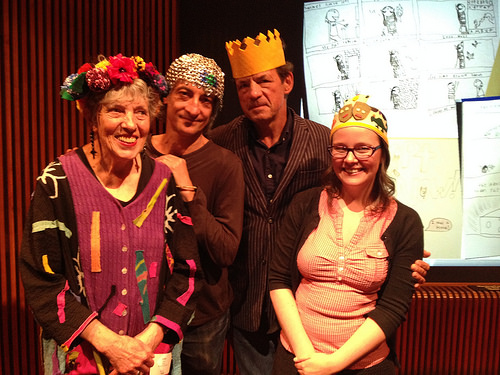 |
|
(l.-r.) Lois Ehlert, Chris Raschka, Peter Sís and Raina Telgemeier.
|
"Most American musicians know who Sun Ra is, most Americans do not," said Chris Raschka, explaining the impetus for his The Cosmobiography of Sun Ra (Candlewick). He started with Sun Ra's "Dreaming" and made the book as a song. Editor Liz Bicknell told him, "We'll publish it, but we have to know more about the man," according to Raschka. "He's worth studying," Raschka explained, "because he lived his life so much the way he wanted to."
Peter Sís said that, as a young man, The Little Prince gave him hope, as he was deciding whether to return to Prague after working on a project in Los Angeles. He revisited the book again and again, and it inspired his biography The Pilot and the Little Prince (Frances Foster/Macmillan). "My secret, that [Antoine de Saint-Exupéry] wrote The Little Prince in New York, was out--there it was at the Morgan Library's exhibit [this past spring]." Sís worked on the book for years, trying to contain such a big life in a picture-book format. "When I'm stuck, I sit for weeks and make little cross-hatches," he admitted. Raina Telgemeier said that only after publishing her first book, Smile, did she learn "you're not supposed to write [an autobiography] unless you've done something." Her new book, Sisters (Graphix/Scholastic), "is the road trip from Smile that only gets a passing mention." Telgemeier says, "I tell very personal specific stories, thinking this doesn't happen to anyone else, and then the letters come." --Jennifer M. Brown
 "Foyles is making a heroic attempt to put curation back in to the heart of bookselling--inviting authors such as P.D. James and Sarah Waters to pick their favorite books to have on front-of-store tables, for example. It is commendable, too, that the store wants to emphasize the 'beauty' of the book as a physical item, as with the art books in the key space by the door. But the best, best bit in all of this is Foyles' defiance of discount. Books are precious objects that are sometimes--quite often--worth much more than the price of a cup of tea."
"Foyles is making a heroic attempt to put curation back in to the heart of bookselling--inviting authors such as P.D. James and Sarah Waters to pick their favorite books to have on front-of-store tables, for example. It is commendable, too, that the store wants to emphasize the 'beauty' of the book as a physical item, as with the art books in the key space by the door. But the best, best bit in all of this is Foyles' defiance of discount. Books are precious objects that are sometimes--quite often--worth much more than the price of a cup of tea."










 The new
The new  This fall, Books-A-Million will open a new 5,922-square-foot store in the
This fall, Books-A-Million will open a new 5,922-square-foot store in the 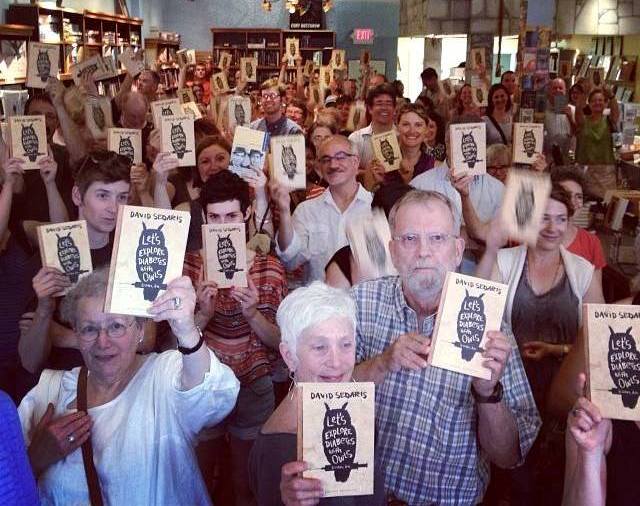
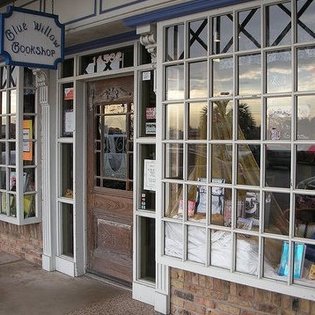 "It's summer time and the reading is easy--especially for Houston book lovers familiar with the Bayou City's independent bookstore scene,"
"It's summer time and the reading is easy--especially for Houston book lovers familiar with the Bayou City's independent bookstore scene," 
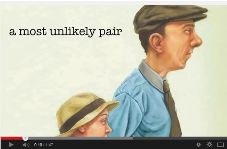 Francis and Eddie: The True Story of America's Underdogs
Francis and Eddie: The True Story of America's Underdogs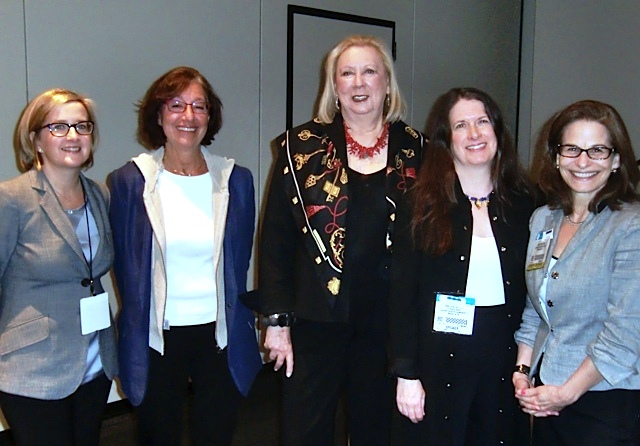





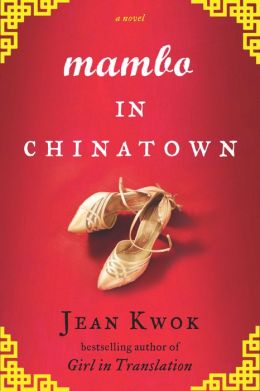 Jean Kwok (Girl in Translation) draws on her experience as a professional ballroom dancer in this tale where familial obligation and the pursuit of passion conflict. New Yorker Charlie Wong, 22, is the backbone of her small family. Charlie's mother, a former soloist with the Beijing Ballet, passed away when Charlie was 14, so Charlie became a stand-in mom to her little sister and washes dishes at the restaurant where her father makes noodles to help him pay the bills. When she lands a new job as receptionist at a ballroom dance studio, Charlie hopes her fortunes might change. Thanks to her undiagnosed dyslexia, however, she fails miserably in her new role. Even so, her new employers are impressed by her warm personality and natural talent on the dance floor, so they offer her a position as instructor instead.
Jean Kwok (Girl in Translation) draws on her experience as a professional ballroom dancer in this tale where familial obligation and the pursuit of passion conflict. New Yorker Charlie Wong, 22, is the backbone of her small family. Charlie's mother, a former soloist with the Beijing Ballet, passed away when Charlie was 14, so Charlie became a stand-in mom to her little sister and washes dishes at the restaurant where her father makes noodles to help him pay the bills. When she lands a new job as receptionist at a ballroom dance studio, Charlie hopes her fortunes might change. Thanks to her undiagnosed dyslexia, however, she fails miserably in her new role. Even so, her new employers are impressed by her warm personality and natural talent on the dance floor, so they offer her a position as instructor instead.